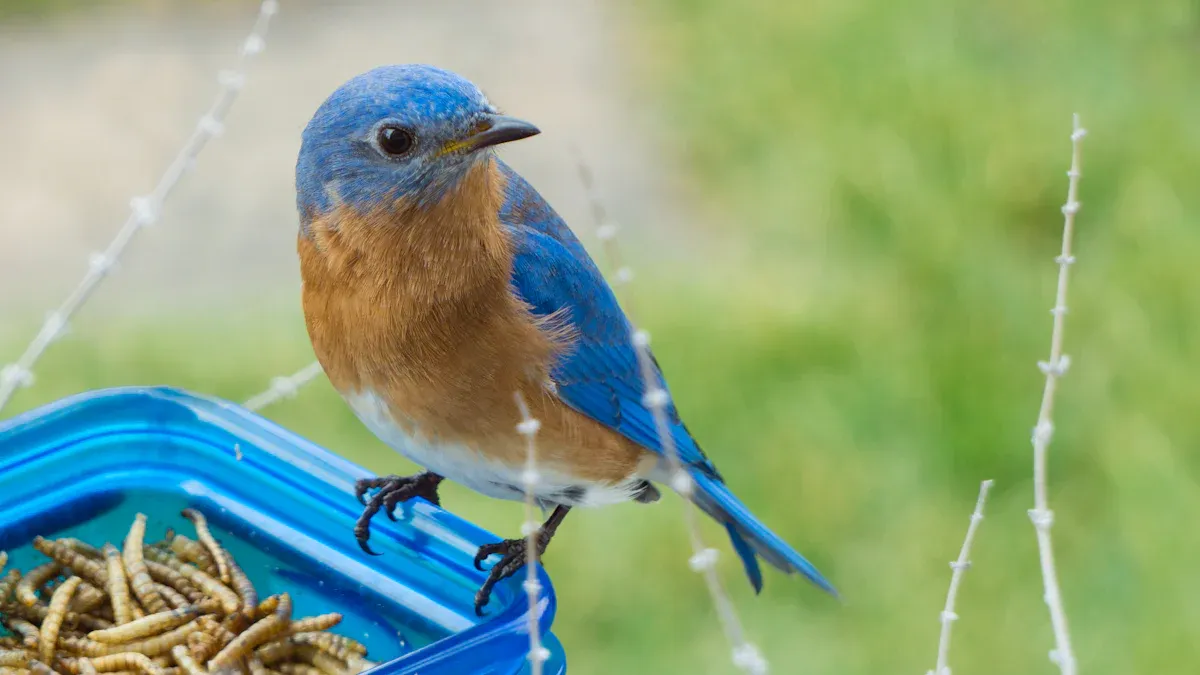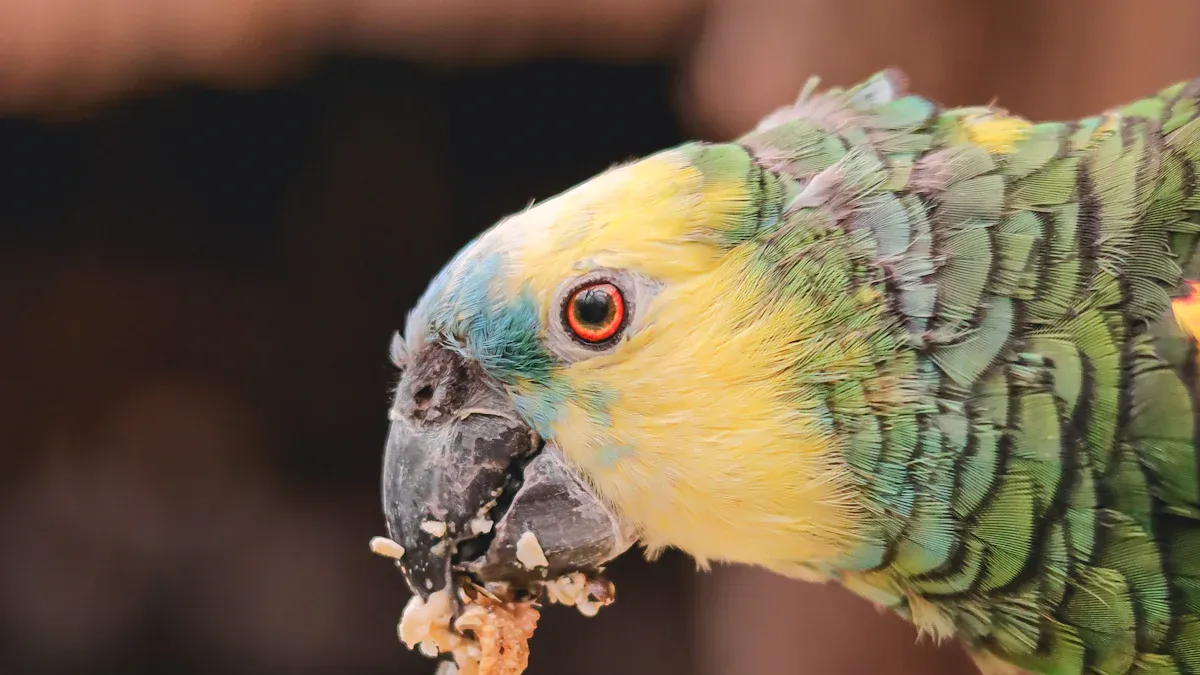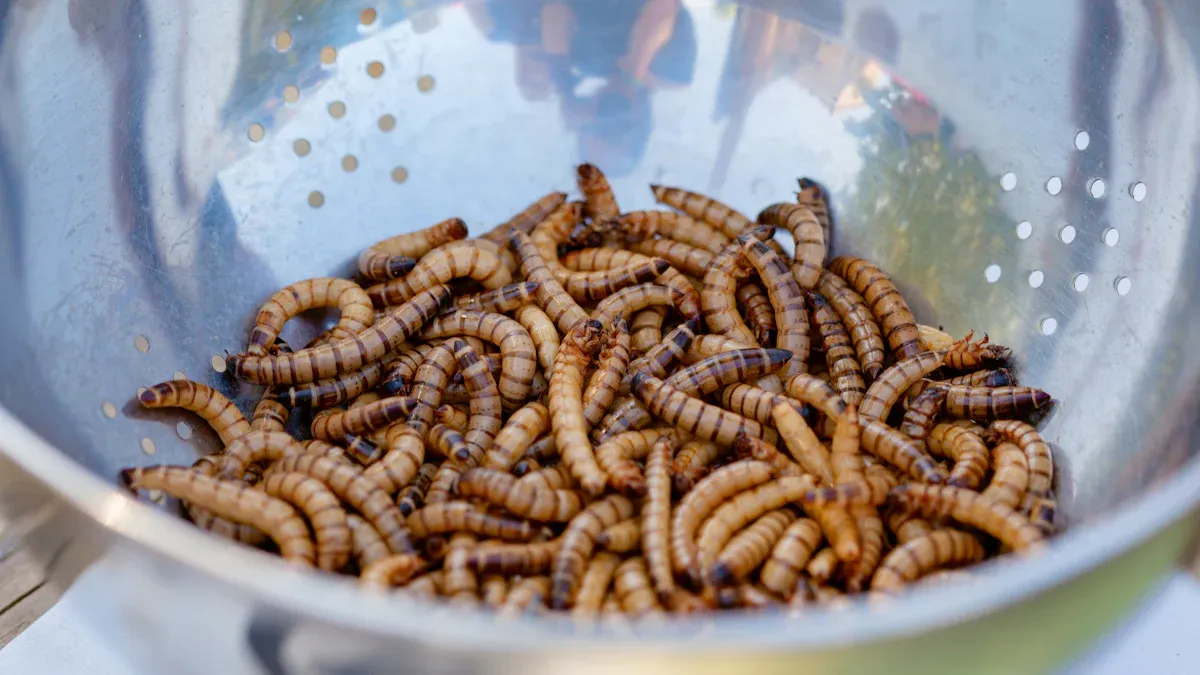
- Mealworms for parrots bring a burst of energy to every bite.
- These little snacks pack high-quality protein, healthy fats, and key vitamins.
- Parrots dive into natural foraging, chasing wiggly treats with wild excitement.
- Responsible owners offer mealworms in moderation, keeping feathered friends happy and healthy.
Key Takeaways
- Mealworms provide parrots with high-quality protein, healthy fats, and essential vitamins that support muscle growth, feather health, and energy.
- Offering mealworms encourages natural foraging behavior, keeping parrots mentally active and reducing stress-related habits.
- Feed mealworms in moderation—2 to 4 worms, 2 to 3 times a week—and always choose clean, safe sources to keep parrots healthy and happy.
Nutritional and Behavioral Benefits of Mealworms for Parrots

Complete Protein and Essential Amino Acids
Parrots need strong muscles and quick reflexes to climb, fly, and play. Mealworms for parrots deliver a protein punch that helps them stay active and healthy. Scientists have tested mealworm protein using a special rooster assay, which shows that mealworms contain all the essential amino acids parrots need. These amino acids help repair tissues and build new feathers. The protein in mealworms is highly digestible, so parrots can absorb the nutrients easily.
Here’s a quick look at how mealworms stack up against other common protein sources:
| Protein Source | Protein Content (%) | Essential Amino Acids | Digestibility (%) |
|---|---|---|---|
| Mealworms | 40.2 – 63.3 | Complete set | >90 |
| Soybean Meal | ~49.4 | Good, but less diverse | High |
| Fish Meal | 60 – 72 | Good | High |
Mealworms fill the nutritional gaps left by seeds and fruits, making them a smart addition to a parrot’s diet.
Healthy Fats and Energy Support
Parrots burn a lot of energy during playtime and exploration. Mealworms for parrots provide healthy fats that keep their brains sharp and their feathers shiny. The fat content in mealworms ranges from 13% in live worms to as much as 43% in dried ones. These fats include important fatty acids like linoleic and oleic acid. Parrots use these fats for energy, especially during molting or colder months. Birds love the taste, and the extra energy helps them stay lively and alert.
Tip: Offer mealworms as a treat during high-energy activities or when your parrot needs a little boost!
Vitamins, Minerals, and Moisture Content
Mealworms are more than just protein and fat. They also bring a sprinkle of important vitamins and minerals to the table:
- Iron, zinc, copper, manganese, and selenium support immune health and metabolism.
- Small amounts of vitamins A, B, and E help with vision, nerve function, and feather quality.
- Fatty acids in mealworms keep skin and feathers in top shape.
| Nutrient | Benefit for Parrots |
|---|---|
| Iron | Supports blood health |
| Zinc | Boosts immune system |
| Copper | Helps with feather pigmentation |
| Manganese | Aids metabolism |
| Selenium | Acts as an antioxidant |
| Vitamin E | Protects cells and feathers |
Mealworms also contain moisture, which can help keep parrots hydrated, especially when served live.
Promotes Foraging and Mental Enrichment
Wild parrots spend hours searching for food. Captive parrots need that same challenge to stay happy. Mealworms for parrots encourage natural foraging behaviors. Parrots love to hunt, dig, and chase after these wiggly treats. Studies show that when parrots work to find their food, they show fewer abnormal behaviors like feather picking. Foraging with mealworms keeps their minds busy and their instincts sharp.
Note: Hide mealworms in foraging toys or under paper to turn snack time into a fun game!
Enhances Feather Condition and Immune Health
A parrot’s feathers are its pride and joy. Mealworms help parrots grow strong, colorful feathers thanks to their rich protein and fat content. The minerals and vitamins in mealworms also support a healthy immune system. Parrots that enjoy foraging for mealworms often show better feather condition and less stress.
For owners who want to give their birds a nutritious and exciting treat, high-quality mealworms make a great choice. Always choose mealworms from a trusted source to ensure they are clean and safe for your feathered friend.
Safe Feeding Practices for Mealworms for Parrots

Live vs. Dried Mealworms: Pros and Cons
Parrots face a big decision at snack time: live or dried mealworms? Each type brings its own set of perks and quirks. Live mealworms wriggle with excitement, sparking a parrot’s hunting instincts. They offer moisture, softer shells, and a more natural eating experience. Dried mealworms, on the other hand, win points for convenience and longer shelf life. They pack more protein by weight because the water is gone, but they lack the juicy freshness of their live cousins.
Here’s a quick comparison to help owners decide:
| Aspect | Live Mealworms | Dried Mealworms |
|---|---|---|
| Nutritional Content | Moist, gut-loaded for extra nutrition | Higher protein by weight, less moisture |
| Pathogen Risk | Possible, needs careful sourcing | Lower, drying kills most pathogens |
| Storage and Handling | Needs cool, live storage | Easy to store, no special care |
| Bird Preference | Most parrots love the chase! | Some birds need training to accept |
| Digestibility | Softer, easier to digest | Harder shells, may need soaking |
Tip: For maximum nutrition, gut-load live mealworms with healthy foods before serving. For dried mealworms, try soaking them in water to soften up the shells.
How Much and How Often to Feed
Parrots love treats, but moderation keeps them healthy. Experts recommend offering mealworms for parrots only 2 to 3 times per week. Each feeding should include just 2 to 4 mealworms. That’s less than 6% of a parrot’s total diet. This small portion gives a protein boost without tipping the scales toward obesity or nutritional imbalance.
| Aspect | Recommendation |
|---|---|
| Feeding Frequency | 2–3 times per week |
| Portion Size | 2–4 mealworms per feeding |
| Diet Proportion | Less than 6% of total diet |
Note: Overfeeding can lead to obesity, liver problems, and even calcium depletion. Keep portions small and treats occasional.
Safety Tips and Sourcing Considerations
Safety comes first when serving mealworms for parrots. Owners should always choose mealworms from reputable sources. Clean, chemical-free mealworms keep parrots safe from harmful substances. Wild-caught mealworms may carry pesticides or parasites, so they should stay off the menu.
- Store mealworms in airtight containers to keep out pests and moisture.
- Refrigerate for long-term freshness.
- Clean storage bins every two weeks.
- Remove any spoiled or uneaten mealworms right away.
- Always provide fresh water nearby, especially when feeding dried mealworms.
Alert: Never feed damp, moldy, or wild-caught mealworms. These can make parrots sick.
Digestibility and Serving Suggestions
Parrots sometimes struggle with the tough shells of dried mealworms. Soaking dried mealworms in water makes them easier to chew and digest. Live mealworms, with their softer exoskeletons, slide down more easily. Mixing mealworms with fruits, seeds, or suet cakes creates a balanced snack and adds variety to the diet.
- Serve live mealworms in feeders with tall sides to prevent escape.
- Add slices of apple or carrot to the mealworm container for extra moisture.
- Gut-load live mealworms with nutritious foods like wheat germ or powdered milk before feeding.
- Offer mealworms in small amounts, especially during breeding or molting seasons.
Callout: Parrots may need time to recognize dried mealworms as food. Introduce them slowly and mix with favorite treats.
Role in a Balanced Diet Compared to Other Treats
Mealworms for parrots shine as a protein-rich treat, but they work best as part of a varied menu. Seeds and nuts bring healthy fats and some protein, but they lack the complete amino acid profile found in mealworms. Fruits and sprouts add vitamins and energy, yet fall short on protein. By combining mealworms with these other foods, owners give parrots a diet that supports muscle growth, feather health, and boundless energy.
| Treat Type | Protein | Fat | Vitamins/Minerals | Unique Benefit |
|---|---|---|---|---|
| Mealworms | High | High | Yes | Complete amino acids |
| Seeds/Nuts | Medium | High | Some | Healthy fats, energy |
| Fruits/Sprouts | Low | Low | High | Hydration, vitamins |
Parrots thrive on variety. Mealworms for parrots fill the protein gap, while seeds, nuts, and fruits round out the rest of the nutritional puzzle.
Parrots leap for joy when mealworms for parrots land in their bowls. These treats boost muscle and feather health, spark foraging fun, and deliver a protein punch. Owners should offer mealworms as a special snack, watch their birds closely, and always check with a vet before changing the menu.
FAQ
Can parrots eat mealworms every day?
No, parrots should not eat mealworms daily. They thrive on variety. Mealworms work best as a special treat, not a main course.
Do mealworms make parrots’ feathers brighter?
Yes! Mealworms help parrots grow shiny, colorful feathers. The protein and healthy fats in mealworms support feather strength and vibrant color.
How can owners introduce mealworms to picky parrots?
Owners can hide mealworms in favorite foods or foraging toys. Parrots love a tasty surprise. Some birds need a little time to try new snacks.


